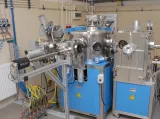Published: 20.01.2023
Scientists from eight European countries and different disciplines will come together to research new types of sensors. Researchers from the Faculty of Chemical Technology at the University of Pardubice are also part of the project. The innovative sensors are intended to improve water quality monitoring in the Green Deal for Europe context.
Within four years, scientists should develop photonic and electrochemical sensors that can detect, for example, microplastics, organic substances, the proportion of minerals or heavy metals, and determine other physicochemical parameters of water.
The project involves scientists from France, Germany, Great Britain, Spain, Belgium, Finland, Poland and the Czech Republic. The research has received EUR 4.7 million from the European Horizon programme.
"It is a great achievement to be part of this prestigious and ambitious project. The collaboration with top scientists from different disciplines across Europe and the opportunity to participate in cutting-edge innovative technology is particularly valuable. The Pardubice group within the consortium will be mainly involved in developing a module for the mid-infrared region of the spectrum," said Prof. Petr Němec, Dean of the Faculty of Chemical Technology of the University of Pardubice, who is also the head of the scientific team.
The multidisciplinary project makes use of expertise in material science but also in microfluidics and data processing. The research will result in four new sensor modules based on complementary photonic and electrochemical technologies. These will be tested by the researchers and combined into a modular system that can monitor a wide range of parameters with greater accuracy than existing solutions. In addition, it will offer user-friendly operation, versatility and reliability, which will finally be tested in real-life conditions.
As a result, the new technology will help prevent water pollution and improve water treatment. That is in line with the European Union's action plan towards zero air, water and soil pollution, which is part of the European Green Deal.
Pardubice 19 January 2023
Mgr. Martina Macková
Head of the Department of Promotion and External Affairs of the University of Pardubice



